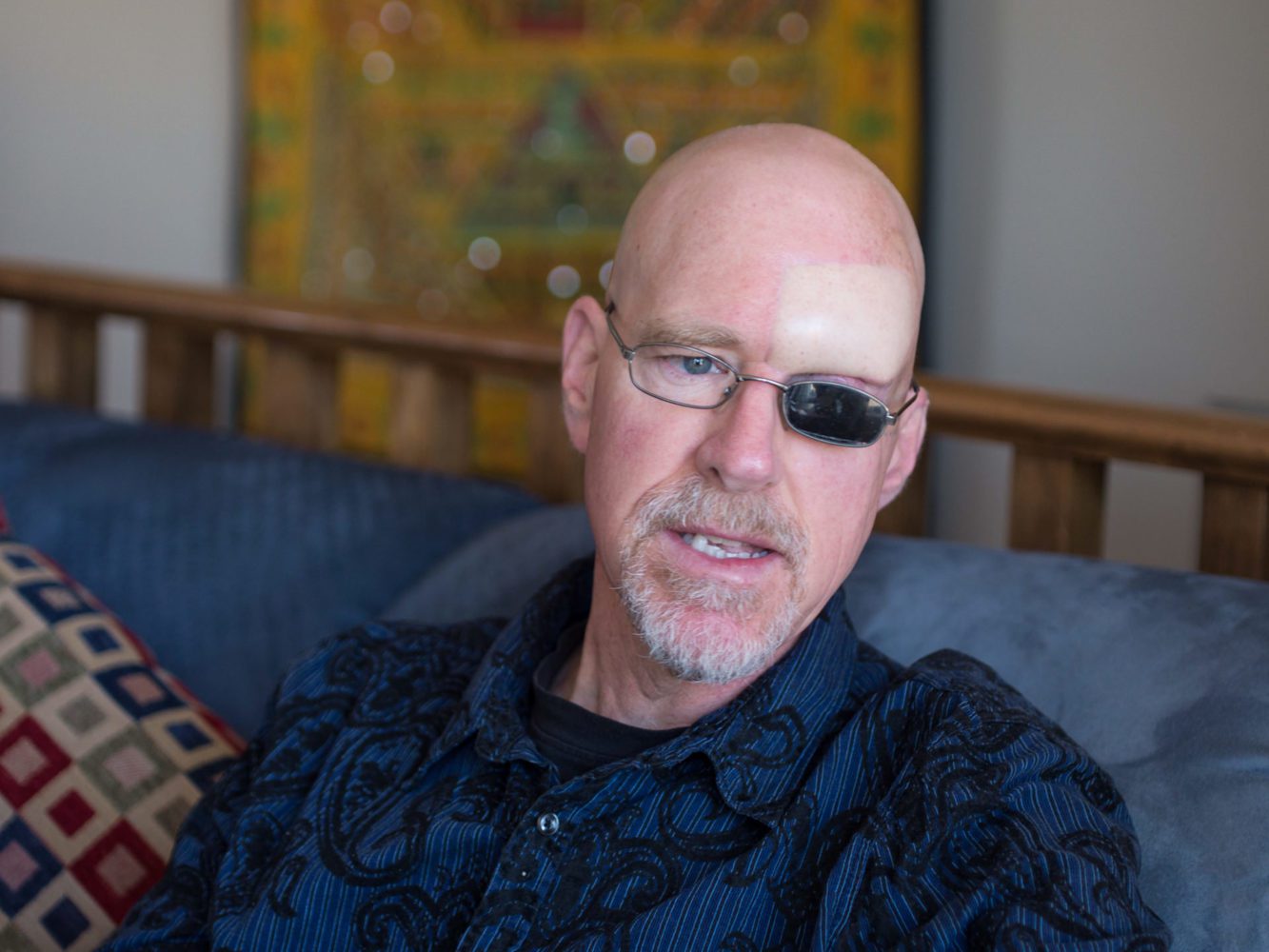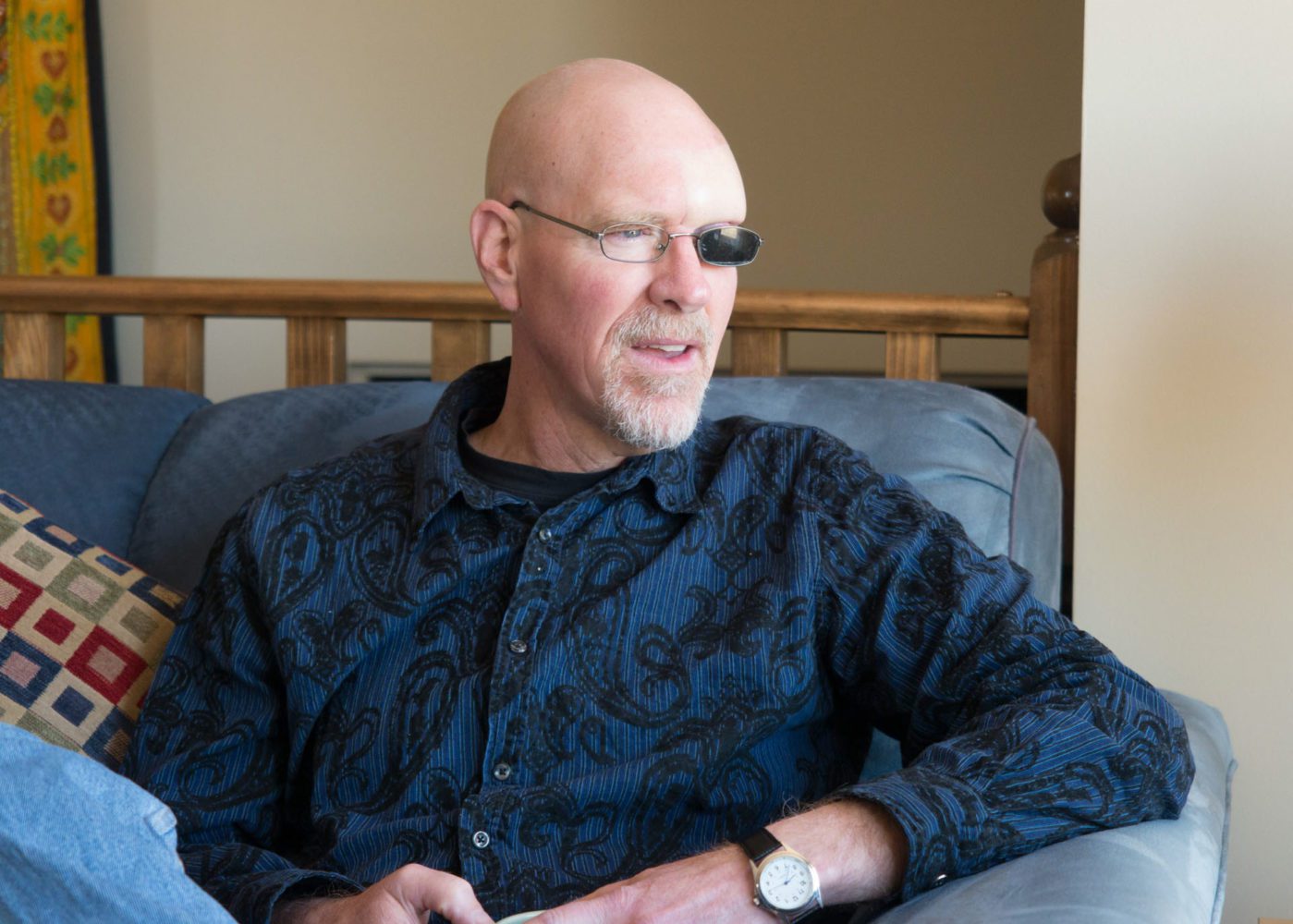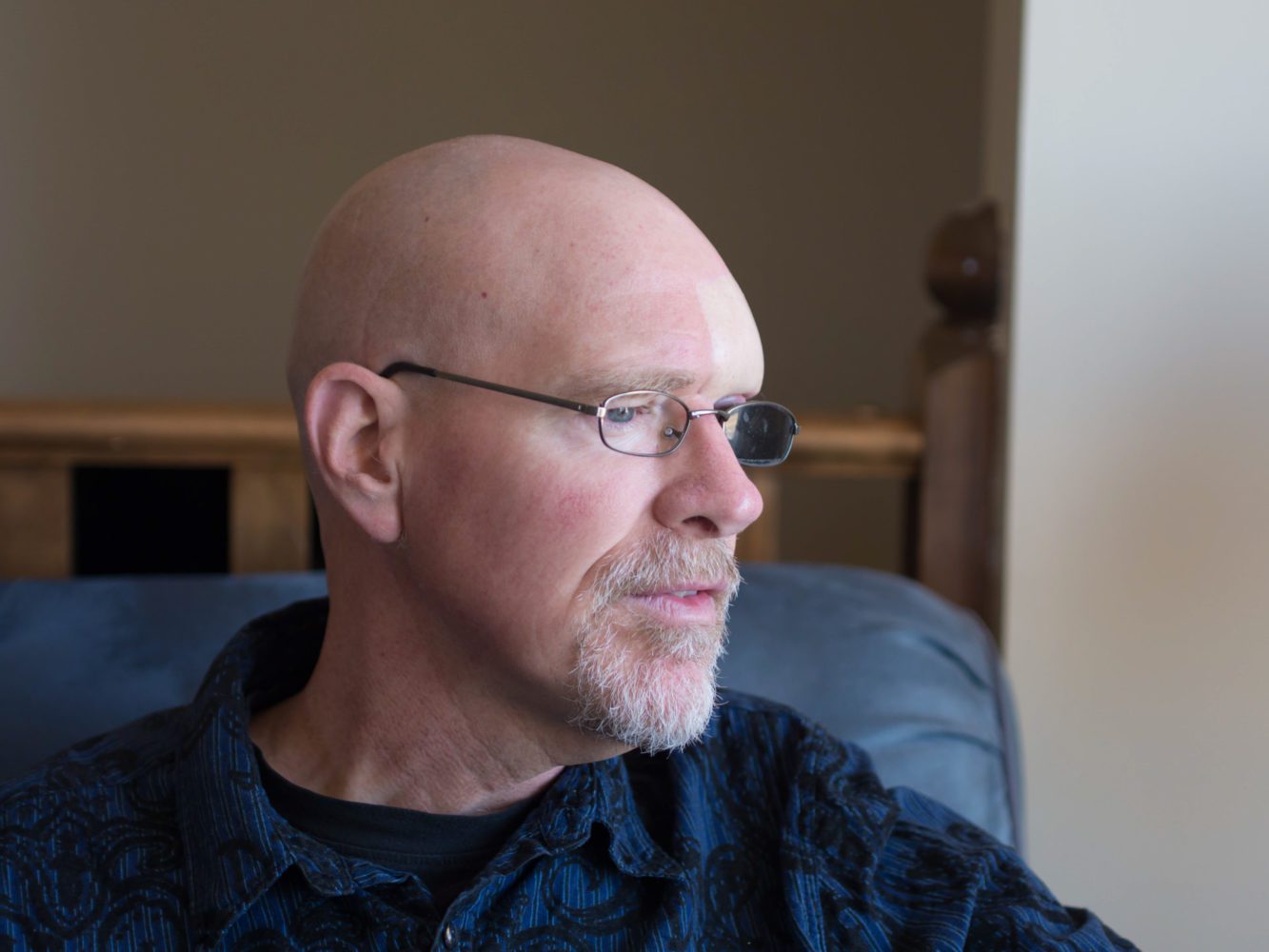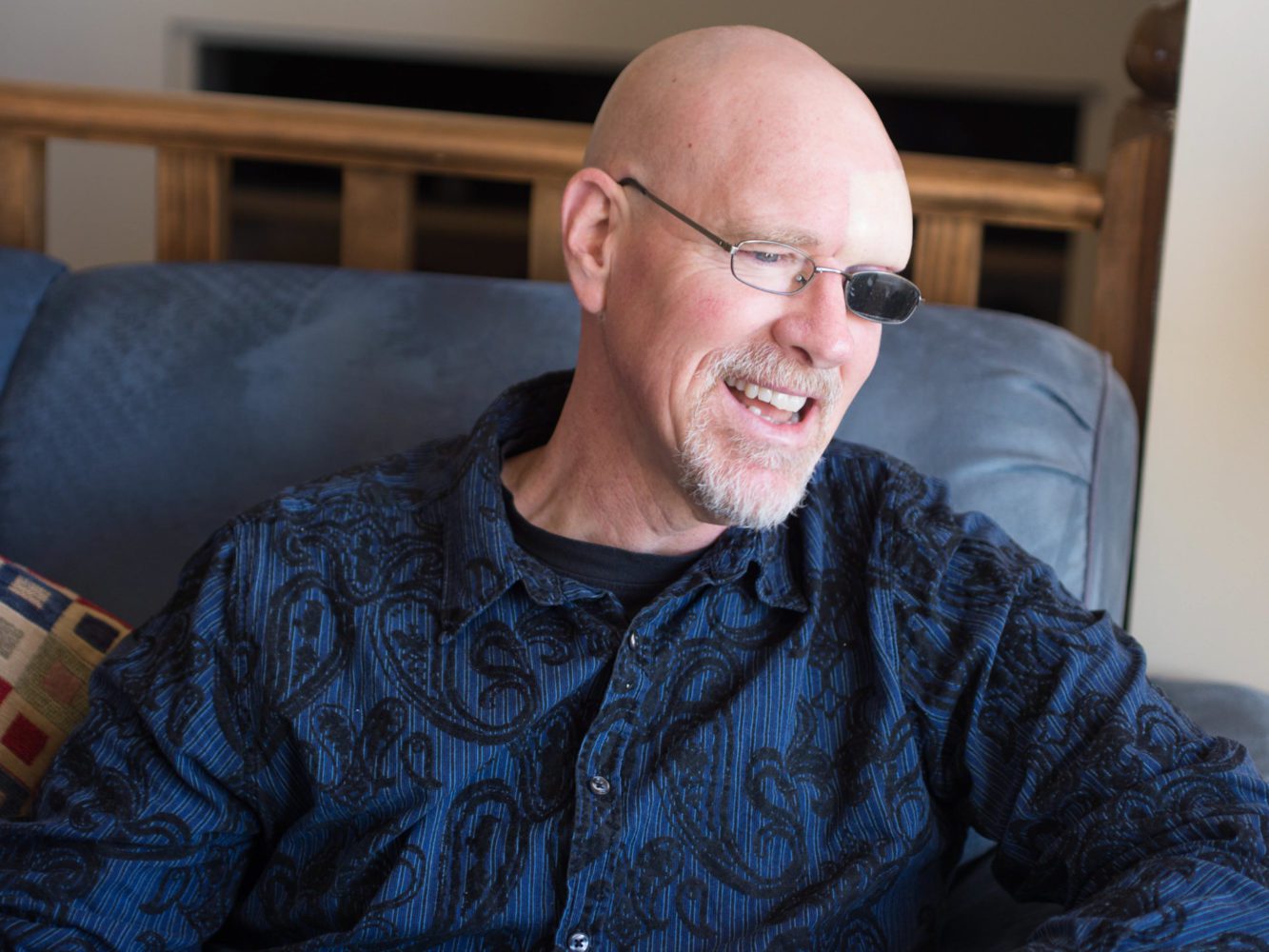David served as the moderator of the United Church of Canada from 2006 to 2009. During that time, he found out he had a malignant cancer that had been misdiagnosed for years. His diagnosis and treatment gave him a new appreciation of vulnerability and suffering as paths to love, and even freedom.
“I discovered a small lump on my temple and had it removed. It recurred and they told me it was just a tenacious kind of benign tumor. Many years later, I saw a surgeon in Toronto who removed a lump again. It turned out to be malignant. He got my previous biopsy, re-looked at it and discovered that it had been malignant all along.”
“I’ve had complications from my surgery and radiation treatments – I’ve had a stroke, I have no tear gland in one eye, I have problems with my teeth on one side, and I’ve had cataract surgery and a detached retina.”
“The two specialists I see in Toronto have been fantastic. They’ll arrange their time so that I can see them both at once. I’ve also used the Ontario Telemedicine Network. I did my post-surgery exam with the Toronto doctors through video conference from the local hospital here, which was great.”

“I continued as moderator of the United Church of Canada during my cancer treatment. The first thing that people said was to go home and take care of my health; they would be able to keep things running without me. But I didn’t want to hide my illness.”
“For some people, a disability or illness is kind of an embarrassment. You know, “God isn’t fixing you or taking care of you. If you had enough faith you wouldn’t get sick.”
“My illness made me think of my personal vulnerability, but also all of our vulnerability. At the end of my term as Moderator, I actually had a passage from Corinthians 4:7 tattooed onto my back, which reads, ‘We have this treasure in earthen vessels.’”
Our bodies are jars of clay. Our bodies are imperfect.
“But as Leonard Cohen writes, ‘There is a crack in everything. That’s how the light gets in.’”
“So that became what I talked with people about when I traveled, and in some ways I think people were more attentive because I became vulnerable. I think of Jack Layton’s last campaign and people said, ‘Oh you know, he shouldn’t use the cane.’ But I think there’s a humanizing experience in encountering one another in a more vulnerable way.”

“An important part of my work as a minister is to be with people when they are ill. To be present, to listen, and sometimes to work with them theologically. People often ask, “Why me?” A lot of times I just listen, but when the question seems genuine and the person is healthy enough to want to really explore those questions, we start talking about all of the good things in our lives too. About freedom and how freedom is meaninglessness unless there is a possibility for suffering. I think of when my kids were five and six and they wanted to go across the street to the park. We could have kept them in the yard; it would have been safe. The park was dangerous. There might be broken glass. They could be abducted. On the other hand, how do you develop as a person, how do you become whole if you are trapped in a little safe space? So we let them go. I think there is something in creation that in a cosmic sense involves freedom, and for freedom to be real there has to be the possibility for goodness and for evil, for freedom and for risk.”
“I hate this whole battle metaphor. If I read one more obituary – ‘Lost his valiant battle with cancer…”
That means everyone who dies of cancer dies a loser.
“I recognize that cancer is part of my body. To battle it is to be in a battle with myself.”
“I am looking for other metaphors that might be helpful. I am starting to explore the pilgrimage metaphor. A journey on which we meet other pilgrims and come to understand ourselves. A book came out recently called ‘Dancing with Cancer,’ which doesn’t really work for me. But I could see how that would be helpful to some people.”
“For me, cancer is a very sacred part of my journey. Matthew Fox is a theologian who talks about four paths to Holiness or to experiencing God or spirituality. Via Positiva is the path through joy, beauty, things around you. Via Negativa means ‘through suffering we can come to know God.’ Via Creativa denotes that being creative awakens our spirituality. And Via Transformativa is the path through social justice. I’ve experienced all of those. Cancer has been my Via Negativa.

“What happens when we are ill is sometimes so unbelievably beautiful. The tenderness that happens within families at that moment of suffering. That awareness of our humanity and our mortality that we keep at a distance most of the time. The kind of intimate, beautiful, sacred conversations that happen in those moments that we would never ever be open to at other times.”
“When I was recovering from surgery one of the guys in the bed next to me grew up in a poor part of Toronto. A poor black kid. He’d become very successful in theatre and film and at the time he was working on a Hollywood action movie. Just before he left the hospital, he said he couldn’t leave until he had prayed with me. So I thought, ‘Okay, he wants me to pray for him.’ But he came around, took my hand, took my wife’s hand and then he said the most beautiful prayer. He was grateful to God that he had met my wife and I. It wasn’t so much the words, but the tactile connection of holding the hands of essentially, a stranger, and both of us having a sense of great connection through our shared vulnerability. Then he said, ‘It’s been really great to meet you,’ and off he went.”
“I wonder whether people realize that this kind of intimacy is going on when people are sick. I think it goes on all the time.”
And I often think our surgeons and nurses are in such a rush that they don’t get a chance to take that in.

“There’s a huge range in the quality of hospital care. Here’s a suggestion for quality improvement questionnaires. Don’t ask about how care was overall. I rated everything as medium. But it wasn’t really medium. I had fantastic people for whom this was obviously their life vocation, and other people who I don’t know what they were doing there. My nursing care was fantastic and it was crappy. Some of the residents were unbelievably compassionate and careful, and others were just totally oblivious.”
“The surgical residents and fellows – oh my gosh! I went back and forth between wanting to give them a slap in the side of the head and feeling sorry for them because they were so busy. My first post-surgical visit with the residents and the fellows – they came whipping in. There were about five of them. I was trying to have a pee. I had the bottle and when they came in I pulled the sheet up. They asked, ‘How it’s going?’ I said, ‘Well, I am having a little trouble peeing.’ I was about to explain when a resident yelled at the nurse to get me on some flomax and put that catheter back in. And then they vanished! They had pulled their gloves on as they came in and were pulling them off in the same movement as they left. There were three rubber gloves lying on top of me. I looked at Pearl, my wife, and I said, ‘Did that just happen?’”
David’s writings on his cancer pilgrimage can be found on the UC Observer website.


The comments section is closed.